Dental Implants Midwest City
Rebuild a Strong, Long-Lasting Smile

When a patient comes to our office and asks for help replacing one or more missing teeth, our team is proud to offer plenty of options to choose from. However, Dr. Kendrick can do more than just replace the appearance of missing teeth — he is dedicated to helping every patient rebuild a strong, long-lasting smile and restore their quality of life. That’s why he almost always recommends dental implants for patients suffering from tooth loss!
This state-of-the-art method of permanently replacing teeth offers numerous benefits that you just can’t achieve with dentures or dental bridges. To see if dental implants in Midwest City are right for you, please call Midwest City Dental Center today to schedule your appointment.
Why Choose Midwest City Dental Center for Dental Implants?
- Dental Implant Placement & Restoration Completed Under One Roof
- Advanced Dental Technology for Comfortable Treatment & Precise Results
- Flexible Financing Options Available Through CareCredit
What Are Dental Implants?
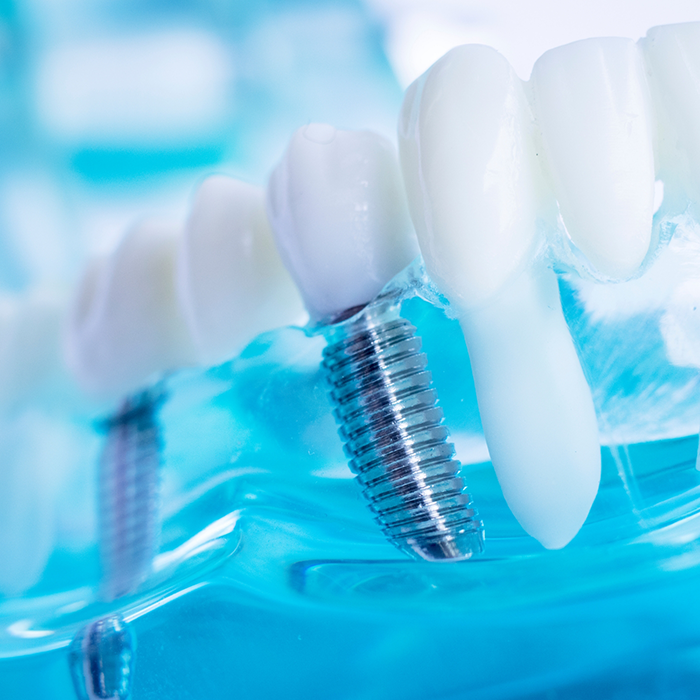
Unlike other tooth replacement options, dental implants replace missing teeth both above and below the gumline. The visible crown of a tooth is replaced with a custom-made restoration, and the root underneath is mimicked with a small metal implant post. It is inserted directly into the jawbone, where it fuses with the surrounding bone tissue. Not only does this provide unmatched stability for the replacement tooth it supports, but it also has the potential to stay in place for decades to come because of this unique placement. The custom-made prosthetic on top of the implant post is carefully designed to blend in seamlessly with the rest of your pearly whites. In the end, replacing missing teeth from the roots up gives you a smile that looks, feels, and functions just like natural.
The 4-Step Dental Implant Process
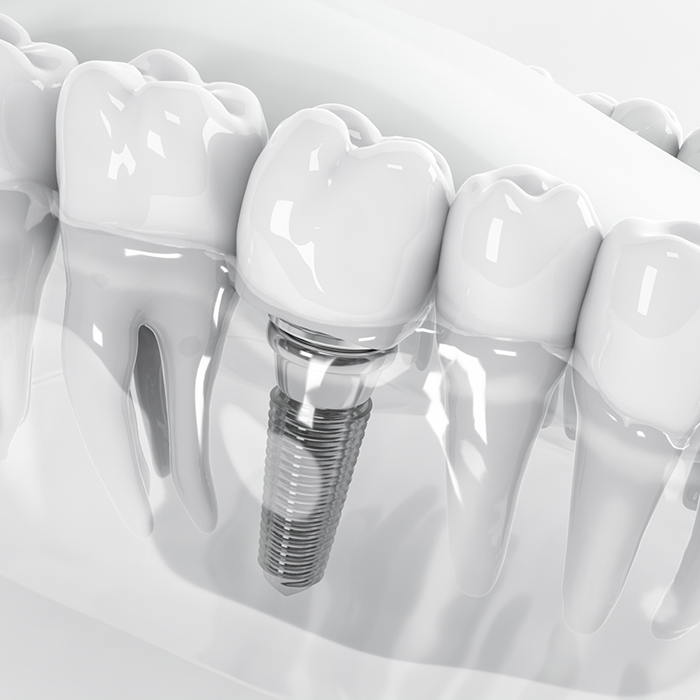
Dr. Kendrick has completed advanced training so that he can perform the dental implant process from start to finish without having to send his patients to a specialist. You’ll have to visit our office several times to get dental implants, but it’ll all be worth the wait once the final restoration is in place and you’re able to use your implant to eat and smile. The dental implant process isn’t exactly the same for everyone, but it will always follow the same four basic steps, which are outlined below.
Initial Dental Implant Consultation

When you decide that you’re interested in getting dental implants, the first thing you need to do is schedule a consultation with Dr. Kendrick so that he can examine your mouth and facial structures. He can determine whether you’re a candidate for dental implants and, if necessary, outline the preliminary work you’ll need before the posts can be placed. (This might involve bone grafting, gum disease treatment, or tooth extractions.) After these procedures are complete, the surgery will be scheduled.
Dental Implant Surgery

We start the procedure by numbing your mouth before making small incisions in the gum tissue so that we can work with the jawbone underneath. We’ll make holes in pre-determined spots so that the implants can be inserted at precisely the right locations and angles. The gums are sutured shut once the implants are in place. A protective cap is then placed on top of the implant posts. Obviously, this is to help protect the implants from damage, but it is also useful for maintaining the shape of the gums during the healing process.
Dental Implant Osseointegration & Abutment Placement
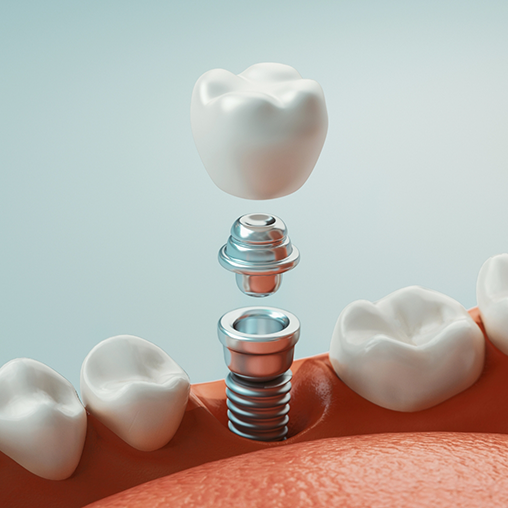
When you get dental implants, you’ll likely hear the term “osseointegration” a lot. This is the name of the process where the implants merge with the jawbone. Successful osseointegration is important if you want to be able to keep your implants for the long term, so you’ll need to follow our post-surgery instructions as closely as possible. Then, once the posts have created a firm bond with the bone tissue, an abutment can be attached. The abutment is the part that will eventually secure your restoration in place.
Delivery of Dental Implant Restoration(s)
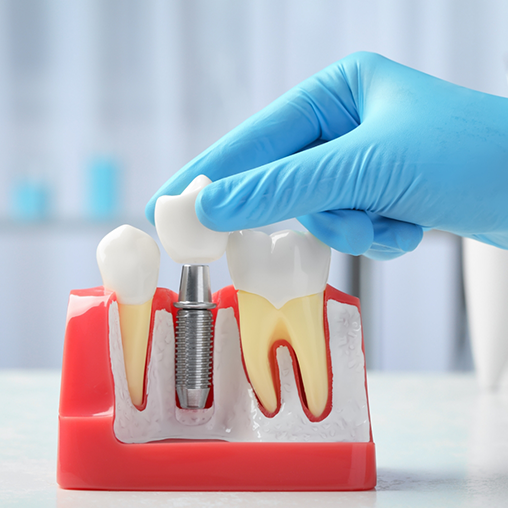
We’ll take an impression of your mouth with your dental implants after the abutments have been placed. A dental lab will use the impression as a guide to create a final restoration that will match the shape, size, and color of your natural teeth, meaning your new ones will blend right in. Once we’ve gotten the final restoration, we’ll set up one last appointment. After we’ve made any last-minute adjustments that we deem necessary to make sure the final result looks as lifelike as possible, we will carefully attach the restoration to your dental implants. By that point, your mouth will be fully healed, so you’ll be able to start getting the most out of your new teeth right away.
Benefits of Dental Implants
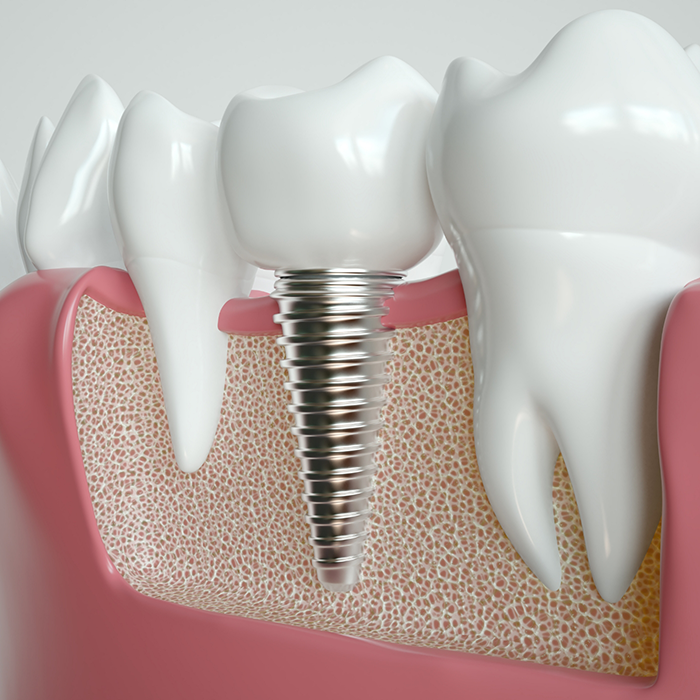
With their unique structure that mimics the root of a missing tooth as well as the crown, dental implants offer countless advantages over dental bridges and dentures alone. As Dr. Kendrick can tell you during your consultation, dental implants are capable of fulfilling virtually all of the functions of your natural teeth. We encourage you to spend a few minutes reading about the numerous benefits of dental implants in Midwest City below and give us a call when you’re ready to learn more about how this tooth loss solution can transform your life!
Day-to-Day Benefits

You might be curious about what your everyday life with dental implants will be like. The truth is that it won’t be that much different from how it was before you lost any teeth! Here’s how:
- Seamless Stability & Appearance: Because your new teeth are anchored onto posts that are embedded in your jawbone, you can trust that they’ll stay firmly in place and will never slip around like dentures notoriously do. Your restorations will also be 100% personalized to complement your facial features and mimic your natural teeth. You’ll be able to smile without anyone even being able to tell that you have dental implants!
- No Slipping or Popping Out of Place: Speaking clearly is often a challenge with poorly fitting dentures that shift out of place. Dental implants, on the other hand, feel so sturdy and natural that you might even forget that you have them when you’re talking with others.
- Comfortably Eat All Your Favorite Foods: Denture-wearers often feel limited in terms of which foods they can comfortably eat. As the only solution to restore the root structure of missing teeth, dental implants in Midwest City provide a more powerful bite force, making it easy to enjoy all of your favorite foods!
Health Benefits

Of course, dental implants are not only cosmetically superior to traditional options. They also benefit your health in various ways, including:
- Enjoy a Balanced Diet for a Healthier Body: With a stronger bite force, chewing nutritious foods like fibrous vegetables and lean meats should be a breeze. As a result, you’ll enjoy improved whole-body health.
- Minimize Your Risk of Further Tooth Loss: Bridges and dentures do not address the jawbone deterioration that occurs after tooth loss, which dramatically increases the risk of additional tooth loss and other oral health problems. Dental implants prevent this issue by stimulating the jawbone in the same way that natural teeth do.
- Easily Maintain Your Oral Health: Taking care of your oral health is leaps and bounds easier with dental implants than with alternative options. All you have to do is brush and floss them like real teeth – no extra tools required! – and visit our office twice a year for checkups from Dr. Kendrick, your trusted implant dentist in Midwest City.
Long-Term Benefits

Dental implants are truly an investment that keeps on giving, even several decades down the road. Here are some of the long-term benefits that dental implants can provide:
- A Solution That Lasts for Decades: Traditional tooth replacements tend to only last for about 10 years at most. In contrast, dental implants have been known to last for 30 years or more! This is because they fuse to your jawbone, essentially becoming a part of your body.
- Stop Jawbone Deterioration & Shrinkage: Because the implant posts stimulate your jaw, they prevent the facial collapse that often occurs in people who have been missing teeth for a long time. You’ll be able to stay looking young for years to come!
- Reliably Successful in the Long-Term: When it comes to a reliable tooth replacement, dental implants are undoubtedly the best choice. Their long-term success rate is usually more than 95 percent.
Who Dental Implants Can Help
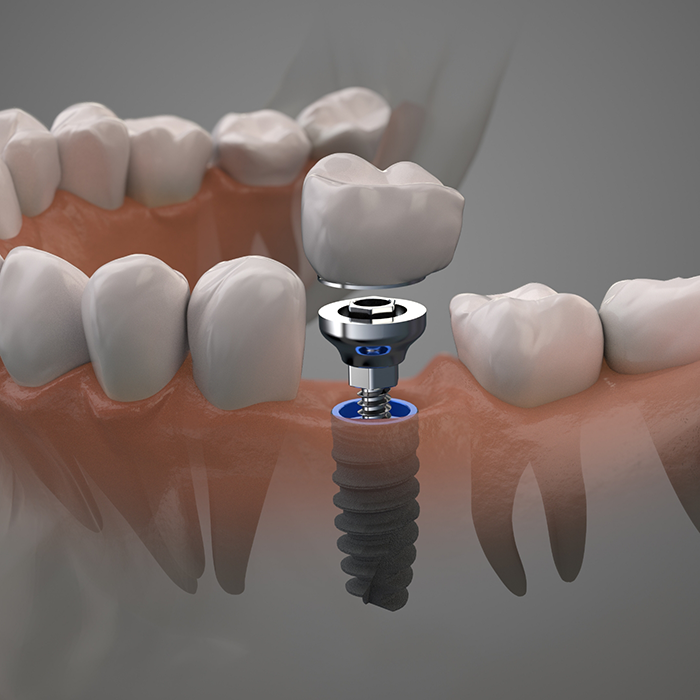
Are you missing one tooth? A few teeth? All of your teeth? No matter the extent of your tooth loss, dental implants may be the ideal way for you to regain a complete, strong, and functional set of teeth. This premier tooth loss solution can help practically any healthy adult replace any number of missing teeth. Whether you’re about to have a tooth extracted, are unhappy with your dentures, or are simply tired of living with gaps in your smile, we can help you replace your missing teeth with dental implants.
Who Is a Good Candidate for Dental Implants?
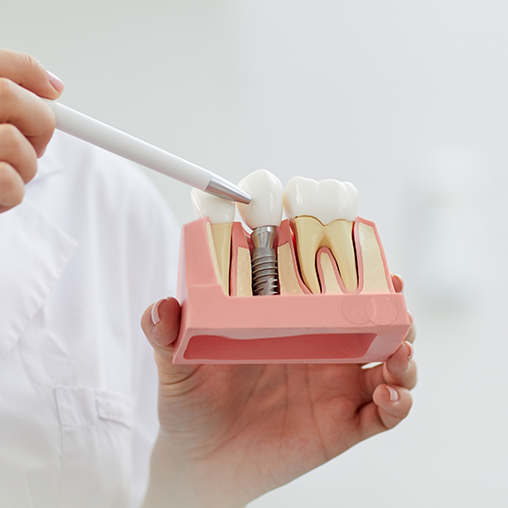
As long as your jawbone is fully developed and you’re relatively healthy, there is a very good chance that you’ll be eligible for dental implants. To be considered a good candidate, you will typically need to have these three things:
- Good overall health: Placing dental implants is a surgical procedure, so you’ll need to be well enough to undergo minor surgery.
- Great oral health: Issues like cavities and gum disease can potentially cause dental implants to fail, so they’ll need to be addressed first.
- Adequate jawbone density: It’s essential that your jawbone is strong enough to support dental implants for your treatment to be successful.
Not every patient is a good candidate initially. Thankfully, preliminary procedures such as bone grafting, gum disease treatment, and tooth extractions can help get you ready for your brand-new smile.
Once you’re a good candidate for dental implants, we’ll work with you to design a custom treatment plan. The number of dental implants you’ll need and the type of restoration will depend on how many teeth you’re missing:
Missing 1 Tooth

To replace a single lost tooth, Dr. Kendrick can insert a single dental implant into the jawbone and top it with a custom-made dental crown. This self-supporting restoration is a much better choice than a traditional dental bridge, which requires filing down the neighboring healthy teeth. A single-tooth dental implant supports the surrounding teeth and encourages a healthier jawbone.
Missing Multiple Teeth
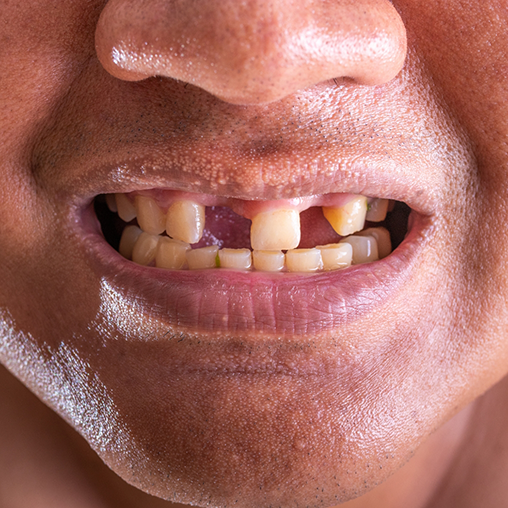
An implant bridge is often the perfect solution for patients who are missing three or more consecutive teeth. This type of prosthetic is similar to a traditional fixed bridge. However, instead of being supported by the remaining natural teeth, it gains all its strength from dental implants that support it on each end.
Multiple missing teeth around the mouth can be individually replaced by single-tooth dental implants. If there are many missing teeth, it may be more cost-effective to pair a partial denture with dental implants to replace them all with a single prosthetic.
Missing All Teeth

For totally edentulous (missing all teeth) patients, an implant denture may be the perfect prosthetic. With just a few strategically placed dental implants, we can anchor a full denture in place to restore an entire arch of missing teeth. Unlike its traditional counterpart, an implant denture will never slip or pop out of place at embarrassing times and allows you to eat all your favorite foods once again. An implant denture can be permanently fixed in place, or it may be removable and simply “snap” onto and off of the implants with the help of small metal attachments.
Dental Implant Technology
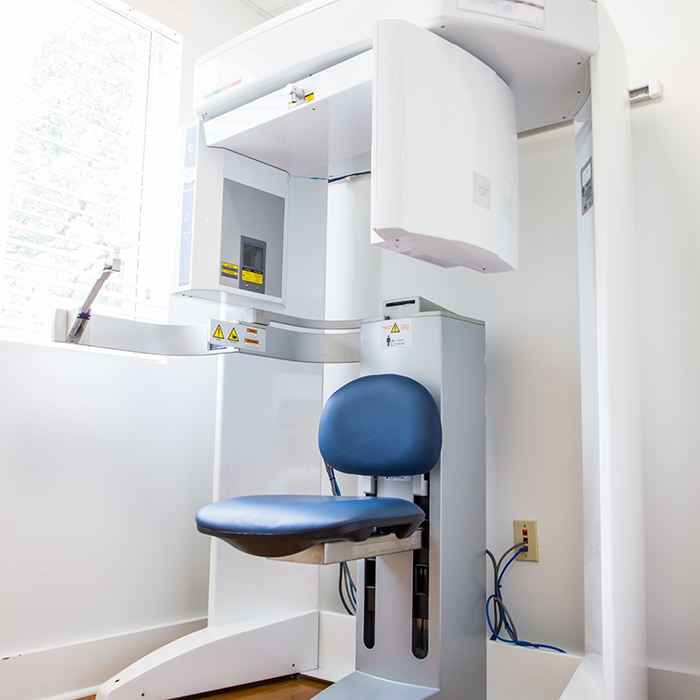
Since we place dental implants in-office, we want to make sure that we’re doing everything we can to help our patients receive the best care possible. As such, we make a point of utilizing the latest advancements in dentistry to plan and perform dental implant surgery. In particular, we use what’s known as a cone beam scanner, or CBCT scanner, to capture important details about your mouth and jaw.
Want to learn more about how this state-of-the-art technology can aid us in rebuilding your smile? Below is a closer look at CBCT scans and why they’re considered an indispensable part of the dental implant process.
What Is a CT/ Cone Beam Scanner?
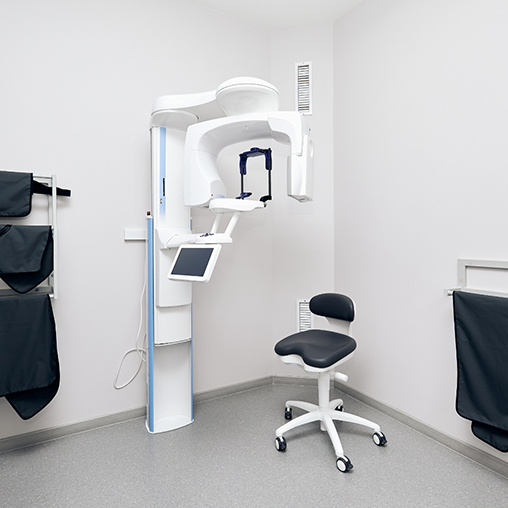
A CBCT scanner is somewhat like an X-ray machine. It even uses the same type of radiation to take pictures of your oral cavity. However, the radiation emitted by a CBCT scanner is shaped like a cone; this allows it to capture multiple images of your mouth from a variety of angles. All of these images are then combined into a comprehensive, three-dimensional model of your mouth. Said model will allow us to examine connective tissues, nerves, and other structures that may not be visible on a normal X-ray image.
How Does a CT/Cone Beam Scanner Help with Dental Implants?
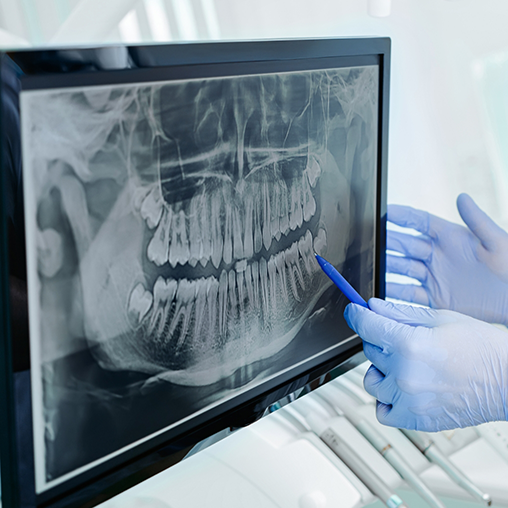
Many procedures can be enhanced with the help of a CBCT scanner, and dental implant placement is certainly among them. To avoid unnecessary complications, we need to insert your dental implant posts in precisely the right part of your jaw. This means we have to carefully plan the surgery so that we can avoid damaging nerve pathways or other important structures. The high level of detail captured by a CBCT scan can go a long way toward making this planning process easier.
What Can You Expect During a Scan?
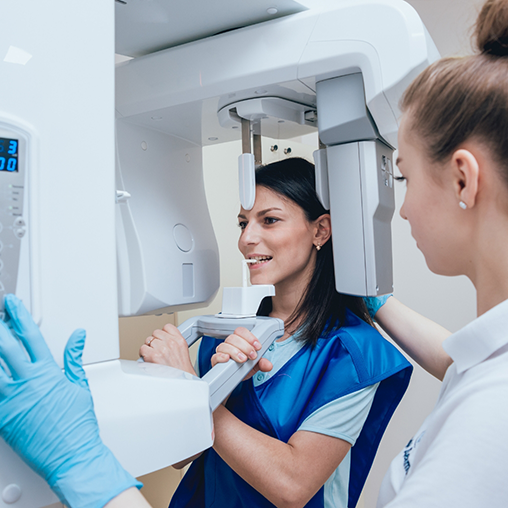
When the time comes to have a CBCT scan performed, one of our team members may ask you to take off any jewelry you might be wearing. This is because said jewelry could potentially block the electromagnetic waves used during the scan.
Once you’re ready, we’ll help you get into the proper position in the machine and then ask you to stay still. The scanning process won’t typically take too long. Some scans may take around 40 seconds, but others are much shorter. Rest assured that your CBCT scan will be noninvasive, and you won’t experience any discomfort while it’s being taken.
After the scans have been completed, the results will be ready for viewing right away. We can review the images with you, point to any areas of significance, and answer any questions you might have. The images will be quite detailed, which will make them highly reliable when it comes to determining where your dental implant posts will need to go once it’s time for the surgery.
Advanced Dental Implant Procedures

During your consultation, we will determine if you are a suitable candidate for dental implants. Even if you are not a candidate right away, you may become one after one or more preliminary procedures. For example, you might need to undergo a bone graft. We can provide this advanced service right here in our office. We perform it with as much precision and efficiency as possible so you can get to enjoy your new smile that much sooner.
Bone Grafting
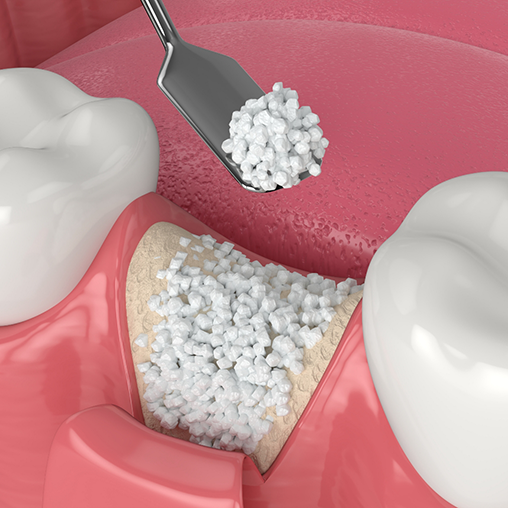
Natural tooth roots stimulate the jawbone. When the natural teeth are extracted, the bone loses that stimulation and starts to deteriorate. In fact, the alveolar ridge (the part of the bone that supports the teeth) may become so weak and small that it cannot support dental implants. Due to this natural resorption process, many patients must undergo a bone graft before they can get their new prosthetic tooth roots. This is especially true among individuals who lost their natural teeth long ago before deciding to pursue implants.
Of course, resorption is not the only possible reason for a bone graft. Some patients are lacking bone in their jaw due to injury, genetics, or other factors.
The bone grafting process varies from case to case, but the basic concept is almost always the same. We create an incision in the gumline, add bone material to the jaw, and close the incision. In the months following the surgery, your body should integrate the new material, resulting in a stronger jaw that can supply a firm base of support for dental implants.
In some instances, we can perform a bone graft and place dental implants at the same time. Most of the time, though, a healing period of several months is necessary. Although this can slow down your tooth replacement timeline, it may be a mandatory step that sets you up for a lifetime of healthy smiles.
The bone we use may come from another part of your body, a donor, or an artificial source. Often, the bone is in granulated form, but in some cases, a block bone graft is necessary.
We will discuss all relevant details of your surgery with you before you commit to anything. You can be confident that we will design a treatment plan with your comfort, health, safety, and long-term wellness in mind.
Dental Implant Failure & Salvage

In most cases, you can trust dental implants to last a long time. Their average success rate is typically over 95%, even ten years after placement! Still, the slight risk of dental implant failure always exists. There’s a chance your new prosthetic will get uncomfortable or unreliable over time. Should this happen, don’t hesitate to call our office. Dr. Kendrick and his team might yet restore your smile with a dental implant salvage treatment.
Learn More About Dental Implant Failure & Salvage
Dental Implants Post-Op Instructions

Once you receive your dental implant posts, it will take some time for your mouth to heal from the surgery. Your implant posts also need time to fuse with the jawbone, which is a process that can take months. As such, the care you give your mouth during this time is vital for making sure your new smile is a success. Below are some dental implant post-op instructions that every patient should keep in mind; feel free to call us if you’d like additional advice.
What to Do Directly After Dental Implant Surgery

A blood clot will form on the implant site after the surgery. This clot needs to stay untouched so that your gums can heal properly. If it becomes dislodged, it will slow down the recovery process and cause a lot of avoidable discomfort. You can protect your blood clot by:
- Swallowing your saliva or using tissues instead of spitting
- Drinking liquids straight from the glass instead of through a straw
- Giving up smoking before and after implant surgery
- Not touching the surgery site with your fingers or tongue
Common Side Effects When Recovering from Dental Implant Placement

Some soreness after implant surgery is completely normal. Over-the-counter pain medications are often enough to keep you comfortable (although, in some cases, the medication will be prescribed). You might notice swelling for at least a week after the procedure; you can keep it down by holding a cold compress on the area for ten minutes at a time. Gradual and intermittent bleeding might occur at first, but applying pressure with gauze should stop it.
If any of these symptoms last longer than expected or seem to grow more severe, let us know immediately. Something may have gone wrong with the healing process, and we’ll need to examine your mouth to figure out what the next steps should be.
Your Diet After Dental Implant Surgery

Plan to eat soft foods for a while after you get dental implants. Mashed potatoes, yogurt, ice cream, pudding, scrambled eggs, and pasta are all good examples of foods you might eat during this time. Soup can also be an excellent option as long as it’s not too hot. You should be able to resume your normal diet after a few days but do not chew directly on the dental implant site until you’ve received your final restoration.
Post-Op Health & Oral Hygiene

It’s okay to brush your teeth the day after surgery, but you need to be extra careful and gentle when cleaning around the surgery site. We recommend rinsing your mouth with salt water at least two to three times every day while your mouth is recovering. You can use mouthwash, but make sure it doesn’t have any alcohol in it.
What to Do After Your New Teeth Are Attached

Compared to what you experience following implant surgery, the recovery process after your new teeth are attached to the post is much simpler. You might experience some mild sensitivity that you can manage with pain medication. There shouldn’t be any swelling or bleeding at this point, so if you do notice such symptoms, call us right away.
Maintaining & Caring for Your Dental Implants

Dental implants can last for more than three decades or even the rest of your life. However, it’s essential that you take all of the proper steps to care for them. If you aren’t taking the time to protect your dental implants from becoming damaged, they could end up failing and need to be replaced with a new implant or another tooth replacement option. The good news is that with a few simple precautions, you can enjoy the benefits of your implants for numerous years down the road.
Make Oral Hygiene a Priority

Dental implants can’t get cavities themselves, but you still need to practice excellent oral hygiene. In addition to keeping your surrounding teeth in good shape, sticking to a great oral hygiene routine can prevent other dental problems, like gum disease, that can cause your implants to fail. Remember to brush, floss, and rinse with mouthwash every day.
Eat a Healthy Diet

One of the many benefits of dental implants is that you won’t need to deal with any eating restrictions. You can easily enjoy a nutritious meal without struggling to chew. Just remember that having too many items that are hard, sticky, or sugary can be problematic for your oral health. Instead, eat foods that have plenty of calcium and vitamin C to keep your jawbone and gums in good shape.
Break Bad Habits

Bad habits can cause your dental implants to fail over time. Refrain from smoking or using tobacco products immediately after your procedure, as they can slow down healing and increase your risk of developing an infection. Don’t use your teeth as tools either, as you could accidentally end up damaging your dental implants or the surrounding teeth. Instead, find scissors, a bottle opener, or another tool that can help you complete your task safely.
Protect Your Dental Implants
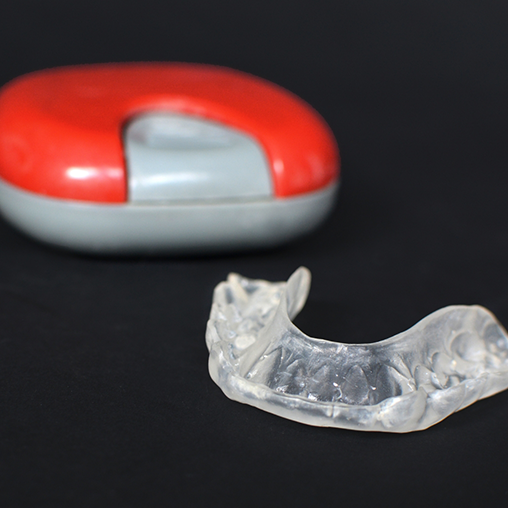
Your dental implants are very strong, but they aren’t indestructible. You should always wear a mouthguard to protect your dental implants and natural teeth when you participate in sports. If you grind your teeth at night, ask about a nightguard to protect your implants from additional wear and tear.
Schedule Regular Dental Checkups

You should attend regular cleanings and checkups every six months. This way, we can monitor your dental implants and spot any issues as early as possible. By catching potential problems now, you can keep them from becoming more serious and leading to additional consequences.
Dental Implant FAQs
How Long Do Dental Implants Last?
The lifespan of dental implants typically depends on the health and lifestyle choices of the patient. To ensure that implants stay in good shape, be sure to brush, floss, and rinse with mouthwash daily. Attend dental checkups and cleanings regularly and avoid chewing on anything particularly hard or sticky. With proper maintenance, dental implants can last upwards of 30 years. This is several times longer than traditional bridges and dentures.
Does Getting Dental Implants Hurt?
The jawbone doesn’t have very many nerve endings, and your mouth will be numbed with a local anesthetic before the procedure begins. You will also most likely be sedated, lowering your body’s ability to register pain. Even though the surgery won’t hurt, your mouth may be sore for a few days afterward. To reduce discomfort, take recommended over-the-counter and prescribed pain relievers as directed. Cold compresses can also help. If the discomfort worsens instead of improving after two or three days, give us a call!
Will I Have to Take Off Work for Dental Implant Surgery?
Most patients only need to take one or two days off to get dental implants. If your job is physically demanding, you may want to take at least three or four days off, as heavy exercise can divert blood from the implant site and delay healing. However, every case is different. During your initial consultation with us, we’ll be able to give you a more specific recommendation for your unique case.
Can I Get Dental Implants If I’m Diabetic?
If your diabetes is under control, your odds of dental implant success are generally comparable to those of nondiabetic patients. Uncontrolled diabetes can slow down the healing process, making it harder for your implants to integrate with your jawbone. If you’re interested in getting dental implants but are diabetic, talk to your endocrinologist or primary care doctor about getting your blood sugar levels under control beforehand.
Can I Take Dental Implants Out?
Since dental implants are surgically placed directly into and fused with the jawbone, they cannot be removed without the intervention of a dental professional. While you should never attempt to remove your dental implants by yourself, some types of implant dentures are designed to be removed for hygiene purposes.
Are Dental Implants Safe?
For most patients who meet the oral health prerequisites, dental implants are incredibly successful as long as a qualified dental professional places them. While issues like low jawbone density or gum disease can preclude someone from receiving dental implants, these issues can often be resolved with periodontal treatments or bone grafts so that the patient can receive them later. If you have any medical conditions such as diabetes, cancer, or heart disease that could complicate the healing process, we will discuss them with you during your consultation and develop your treatment plan accordingly.
How Successful Are Dental Implants?
When a qualified professional places dental implants, they boast an incredible success rate of over 95% even after ten years. However, the success of your implants largely depends on how well you take care of them with your oral hygiene routine, regular dental checkups, dietary decisions, and other lifestyle factors. The location of your dental implant can also impact its likelihood of success. For example, since molars bear more chewing pressure, they can be slightly more likely to fail.
What Can Cause Dental Implants to Fail?
While dental implant failure is uncommon, it generally occurs for two reasons: peri-implantitis and failed osseointegration. Peri-implantitis is a gum disease that can loosen a dental implant by damaging the bones and gums supporting it, and it usually happens because of poor oral hygiene. Failed osseointegration happens when the implant fails to fuse with the surrounding bone structure in the jaw, and this is more likely to happen in patients who have low jawbone density to begin with. Dental implants can also fail due to chronic teeth grinding, tobacco use, certain medications, the head or neck being exposed to radiation, poor oral hygiene, and health conditions such as diabetes, cancer, osteoporosis, autoimmune disorders, and others. Your dentist will develop your treatment plan and provide guidelines to minimize your risk of implant failure.
Am I Too Young to Get Dental Implants?
Since the jaws of most people are not fully developed until early adulthood, placing dental implants too early can interfere with bone development and lead to serious complications. Most dental professionals will not place implants in patients under the age of 18, and some patients will have to wait until their jaws are fully developed in their mid-twenties. Men’s jaws typically take longer to develop than those of women. However, there is no upper age limit for receiving dental implants.
